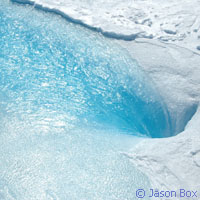Ice sheets' internal plumbing may slow down glacier flow
Hotter summers caused by climate change may not be as catastrophic for the Greenland ice sheet as previously feared and may actually slow down the flow of glaciers, according to new research. The research was funded in part by the ICE2SEA ('Estimating the future contribution of continental ice to sea-level rise') project, which is backed with almost EUR 10 million under the Environment Theme of the EU's Seventh Framework Programme (FP7). The study was recently presented in the journal Nature. The Greenland ice sheet covers roughly 80% of the surface of the island and contains enough water to raise sea levels by seven metres if it were to melt completely. Rising temperatures in the Arctic in recent years have caused the ice sheet to shrink, prompting fears that it may be close to a tipping point of no return. Some of the ice loss has been attributed to the speed-up of glaciers due to increased surface melting. Each summer, warmer temperatures cause ice at the surface of the sheet to melt. This water then runs down a series of channels to the base of the glacier where it acts as a lubricant, allowing the ice sheet to flow rapidly across the bedrock toward the sea. However, this latest study showed how increased melting in warmer years causes the internal drainage system of the ice sheet to adapt and accommodate more melt-water, without speeding up the flow of ice toward the oceans. The findings have important implications for future assessments of global sea level rise. Until now, summertime acceleration of ice flow has proved difficult for scientists to model, leading to uncertainties in projections of future sea level rise. 'It had been thought that more surface melting would cause the ice sheet to speed up and retreat faster, but our study suggests that the opposite could in fact be true,' said Professor Andrew Shepherd from the University of Leeds School of Earth and Environment in the UK. 'If that's the case, increases in surface melting expected over the 21st century may have no affect on the rate of ice loss through flow,' he added, warning however that 'this doesn't mean that the ice sheet is safe from climate change, because the impact of ocean-driven melting remains uncertain'. The researchers used satellite observations of six landlocked glaciers in south-west Greenland, acquired by the European Space Agency, to study how ice flow develops in years of markedly different melting. Although the initial speed-up of ice was similar in all years, slowdown occurred sooner in the warmest ones. The authors suggested that in these years the abundance of melt-water triggers an early switch in the plumbing at the base of the ice, causing a pressure drop that leads to reduced ice speeds. This behaviour is similar to that of mountain glaciers, where the summertime speed-up of ice reduces once melt-water can drain efficiently. Study co-author Dr Edward Hanna from the University of Sheffield in the UK said the research 'also underlines the usefulness of modern gridded climate datasets and melt-model simulations for exploring seasonal and year-to-year variations in Greenland ice sheet dynamics and their relationship with the global climate system'. The ICE2SEA programme is aimed at quantifying the contribution of continental ice to sea-level rise over the next 200 years. To achieve this, researchers will carry out targeted studies of key processes in mountain glacier systems and ice caps, such as Svalbard in the Arctic or Patagonia in South America, and in ice sheets in the polar regions of Greenland and Antarctica. They also plan to develop ice-sheet and glacier models to generate detailed projections of the contribution of continental ice to sea-level rise over the next two centuries.For more information, please visit: University of Leeds:http://www.leeds.ac.uk/Nature:http://www.nature.com/ICE2SEA:http://www.ice2sea.eu/
Countries
United Kingdom



